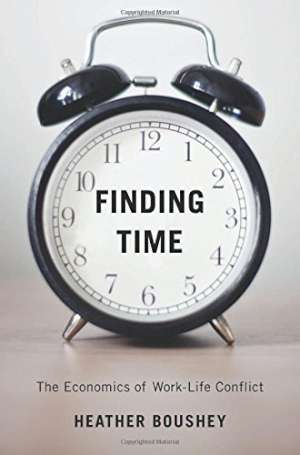28 June 2016
Finding Time: the economics of work‑life conflict
Heather Boushey
2016, Harvard University Press, 324 pages,
ISBN 9780674660168
Reviewer: David Lancefield, Global Leader of Economics and Policy, PwC

This book tackles an incredibly important topic for families, society and the economy: how to nurture a system that helps you get ahead at work and keep a family intact. It proposes a new contract between government, business and citizens cum employees to do this, which nurtures rather than damages productivity for individuals and the economy at large.
Boushey groups solutions in this new contract in to four categories: (1) family and health leave; (2) predictable work schedules; (3) high quality child and eldercare; and (4) efforts to ensure solutions across society. All of have ‘proven both pragmatic and do-able’; the opportunity is for US Government and private companies to scale them up. I did not find the ‘detailed innovations’ promised on the back cover. And some readers in the UK and continental Europe will feel many of the proposals are familiar. This is unashamedly a book for a US audience. More examples from around the world would have broadened its relevance and increased its rigour.
Boushey sets out the case for change, starting with an economic history of how US policy-makers have considered these issues since the 1930s. This is followed by an examination of trends in the economics of family incomes in the bottom, middle and top of the economy to show that they all share a common concern: they have all lost time as more women have taken on jobs as well as caring roles in the families. And now families are no longer able to subsidise work by a parent, typically a mother, staying at home unpaid: “American business used to have a silent partner…for decades, the American wife gave American business a big, fat bonus.”
The book is full of examples and empirical evidence to demonstrate the need for change, which I believe is its most valuable contribution to the policy debate. It is a substantive work. Boushey’s personal anecdotes (especially the reference to the new paths that have developed on Mt. St Helens years after the eruption of the volcano as a metaphor for new paths for labour standards and social policy) and conviction give some colour and sense of humanity to what could have come across as a dry topic. A sharper edit would have helped in places though to avoid banal statements like, “Economists talk of demand and supply together because neither can exist on its own,” and, “We learnt that a firm is not the economy.”
The economic framework is pitched at a foundation level, explaining the dynamics of demand and supply, drawing out the hidden costs and benefits of employment and therefore challenging the notion that supportive policies will damage the performance of companies and the economy. For example, why paid leave increases employee engagement, reduces turnover and hence increases productivity.
The book does not cover the fascinating micro- or behavioural-economics of how to nurture life balance. For example, how to encourage better decisions, overcome fears of disclosure and close informational asymmetries that mean that employees make decisions that do not maximise their potential (or utility) in the long-run, or indeed for the productivity of the company they work for. This would be a good complement to the raft of business books focusing on practical tips on how to work more smartly, focusing on being more disciplined on focusing on the key activities that really matter in the workplace (such as Greg McKeown’s book Essentialism: The Disciplined Pursuit of Less).
Did the book set out the case for change in how we can find a work-life balance that is more sustainable and productive for families and the economy? Yes it did, leaving the door open for a debate on the best solutions and the micro changes individuals can make in their daily lives.
